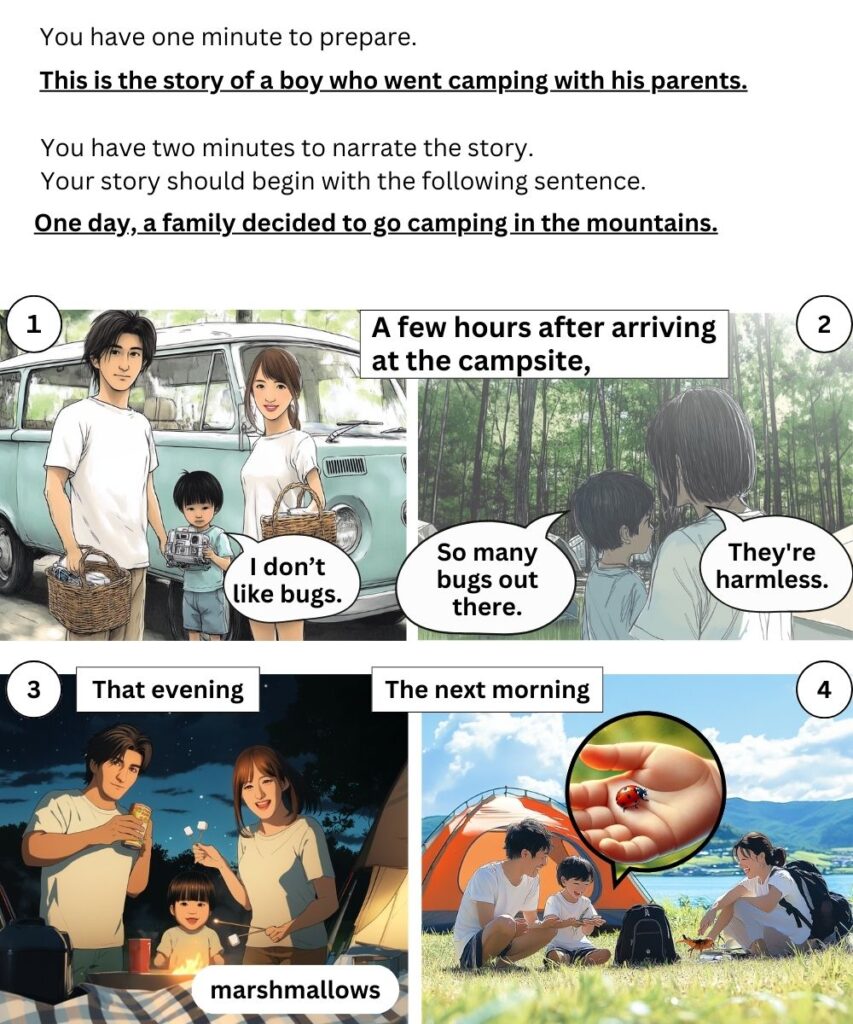メタディスクリプション:
実際の出題形式(問題カード)で英検準1級の面接練習を独学できるページです。
2024年度リニューアル対応!
所要時間:概ね8分
目次
- 1 質問概要
- 2 問題カード
- 3 ナレーションと質問
- 4 質問音源チャレンジ
- 5 解答例
- 6 キャンプ・ジョーク
- 6.1 1. Why did the camper bring an extra pair of socks? In case they got cold feet!
- 6.2 2. How do trees access the internet while camping? They log in!
- 6.3 3. What do you call a bear that’s stuck in the rain? A drizzly bear!
- 6.4 4. Why did the family bring a ladder to the campsite? Because they wanted to have a step up on the camping experience!
- 6.5 5. What’s a camper’s favorite type of dog? A camping spaniel!
- 6.6 6. Why don’t campfires ever get lost? Because they always follow the right path!
質問概要
ナレーション内容を考える(1分間)
イラストの内容を説明するナレーションを考える
ナレーション(2分間):ナレーションを始める
※2分以上続く場合は、途中でも中止させられるので注意
Q&A(No. 1):イラスト関連の質問
イラストに関連した質問。「問題カード」を見ながら解答できます。
※登場人物が考えている事などを聞かれます。
Q&A(No.2, No. 3)
問題カードに関連した、受験者の意見を問う質問
Q&A(No. 4)
問題カードのトピックに少し関係のある質問。受験者の意見を問う質問
※この<No. 4>質問文に「導入文」が追加されました。
問題カード

ナレーションと質問
ナレーション指示
<指示>Look at the pictures carefully and read the directions silently for one minute.(1分間)
<指示>Now, please begin your narration.(2分間)
Question No.1
Please look at the fourth picture. If you were the boy, what would you be thinking?
Question No.2
Do you believe that outdoor activities like camping are important for children’s development?
Question No.3
Do you think it’s important for children to face their fears, like the boy in the story did with bugs?
Question No.4
In today’s digital age, many children are spending more time indoors.
Do you think children are spending enough time in nature?
質問音源チャレンジ
本番のように、英語の質問を聞いて答える練習をしてみましょう。
ナレーション準備
ナレーション開始
Question 1 mp3
Question 2 mp3
Question 3 mp3
Question 4 mp3
解答例
ナレーション例
ナレーション全文聞き流し:
<1> One day, a family decided to go camping in the mountains. The parents were excited to share the beauty of nature with their young son, but they knew he wasn’t very fond of bugs. As they unpacked their things, the boy nervously told his parents that he didn’t like bugs, feeling anxious about what they might encounter in the forest.
ある日、家族が山にキャンプに行くことにした。両親は息子に自然の美しさを共有することに興奮していたが、息子が虫をあまり好まないことを知っていた。荷物を降ろしていると、少年は不安そうに虫が嫌いだと両親に伝え、森でどんな虫に出会うかを心配していた。
「…he wasn’t very fond of bugs.」
“wasn’t very fond of”: 優しく控えめな表現で、「あまり好きではない」や「積極的に好んでいない」というニュアンス。嫌いまではいかないが、好んでいないことを示します。
“didn’t like”:を使った場合、より直接的で、彼が明確に虫を「嫌いだ」と感じていることを表現します。
※どちらを使うかは、息子が虫に対してどれだけ強い感情を持っているかをどの程度強調したいかによって決まります。
<2> A few hours after arriving at the campsite, they began exploring the area. The boy noticed there were so many bugs around and voiced his concern to his parents. They reassured him that the bugs were harmless and encouraged him to enjoy the natural surroundings.
キャンプ場に到着して数時間後、彼らは周囲を探索し始めた。少年はたくさんの虫に気づき、そのことを両親に話した。両親は虫が無害であると説明し、自然の中で楽しむことを勧めた。
「voiced his concern」に似た表現を押さえておこう
1. express a concern – 心配を表明する
2. raise a concern – 心配を持ち出す
3. share a concern – 心配を共有する
4. mention a concern – 心配を述べる
5. bring up a concern – 心配を持ち出す
6. air a concern – 心配を表に出す
7. highlight a concern – 心配を強調する
<3> That evening, the family gathered around the campfire to roast marshmallows. The boy started to relax as he enjoyed the sweet treats, gradually forgetting about the bugs. His parents were happy to see him having fun despite his earlier worries.
その晩、家族は焚き火を囲んでマシュマロを焼いた。少年は甘いお菓子を楽しむうちにリラックスし、虫のことを次第に忘れていった。両親は、彼が最初の心配にもかかわらず楽しんでいる姿を見て安心した。
Despite, In Spite of = ~にもかかわらず:後には名詞や動名詞が続きます。
(虫が怖いにもかかわらず、彼は楽しい時間を過ごしました。)
Despite his fear of bugs, he had a great time.
In spite of his fear of bugs, he had a great time.
<4> The next morning, the boy found a ladybug and held it gently in his hand, feeling less afraid. His parents smiled, pleased to see their son beginning to appreciate the little creatures and the joys of camping. (182 words)
翌朝、少年はてんとう虫を見つけて、そっと手のひらに乗せた。虫に対する恐怖が少し和らいだようだった。両親は、息子が小さな生き物やキャンプの楽しさを理解し始めたことを嬉しく思った。
Question 1 解答例
質問:4枚目の写真を見てください。あなたが少年だったら、どう思いますか?
I would be thinking that maybe not all bugs are scary and that some of them, like the ladybug, can actually be quite interesting and gentle. I might also feel proud of myself for overcoming my fear and being able to enjoy the camping experience with my parents.
自分が少年だったら、すべての虫が怖いわけではなく、てんとう虫のように興味深くて優しい虫もいるかもしれないと思うでしょう。また、自分の恐怖を克服して、両親と一緒にキャンプを楽しめたことに誇りを感じるかもしれません。
Question 2 解答例
キャンプのような野外活動は子供の発達にとって重要だと思いますか?
Yes. Outdoor activities like camping provide children with valuable experiences that help them build confidence, develop problem-solving skills, and connect with nature. These experiences can also teach children about resilience and how to adapt to new environments.
はい。キャンプのようなアウトドア活動は、子供たちに貴重な経験を提供し、自信をつけたり、問題解決能力を養ったり、自然とつながることができるようにします。また、これらの経験を通じて、子供たちはレジリエンスや新しい環境に適応する方法を学ぶことができます。
No. While outdoor activities like camping can be beneficial, they are not always necessary for a child’s development. Some children may develop similar skills through other activities, such as team sports or creative projects, which can also teach them important life lessons.
いいえ。キャンプのようなアウトドア活動は有益である場合もありますが、必ずしも子供の成長に必要とは限りません。チームスポーツや創造的なプロジェクトなど、他の活動を通じて同様のスキルを身につける子供もおり、これらも重要な人生の教訓を教えてくれます。
Question 3 解答例
物語の中の少年が虫に対してそうしたように、子どもたちにとって恐怖と向き合うことは重要だと思いますか?
Yes. Facing fears is an important part of growing up. It helps children learn that they can overcome challenges and become stronger and more confident. By confronting their fears, they also gain a better understanding of themselves and what they are capable of.
はい。恐怖に立ち向かうことは、成長の重要な部分です。これにより、子供たちは挑戦を乗り越え、強く、自信を持つことができるようになります。また、自分の恐怖に向き合うことで、自分自身や自分の能力についてより深く理解できるようになります。
No. While it’s important to encourage children to try new things, forcing them to face their fears might lead to unnecessary stress. It’s crucial to support them in a way that respects their comfort levels, allowing them to face their fears when they are ready.
いいえ。子供たちが新しいことに挑戦するように促すことは大切ですが、恐怖に直面させることは余計なストレスを引き起こすかもしれません。彼らが準備ができたときに恐怖に向き合えるよう、彼らの快適さを尊重しながらサポートすることが重要です。
Question 4 解答例
今日のデジタル時代では、多くの子供たちが屋内で過ごす時間が増えています。
子どもたちは自然の中で十分な時間を過ごしていると思いますか?
Yes. While it’s true that many children spend time indoors on digital devices, there are also numerous opportunities for them to engage with nature through organized outdoor activities, school programs, or family trips, which help balance their lifestyle.
はい。多くの子供がデジタル機器で屋内で過ごすのは事実ですが、アウトドア活動企画や学校のプログラム、家族旅行などを通じて自然と触れ合う機会も数多くあり、それがライフスタイルのバランスを取るのに役立っています。
No. Many children today spend a lot of time indoors on digital devices, which limits their exposure to nature. Spending time in nature is crucial for their physical and mental well-being, and it’s important for parents and educators to encourage outdoor activities.
いいえ。今日の子供たちは、デジタル機器で屋内で過ごす時間が多く、自然に触れる機会が限られています。自然の中で過ごすことは、子供たちの身体的および精神的な健康にとって非常に重要であり、親や教育者がアウトドア活動を奨励することが大切です。
面接練習はask本校にお尋ねください:無料体験レッスン予約
こちらの投稿もおススメです:英検準1級面接問題カード|在宅勤務トピック質問と回答例
キャンプ・ジョーク
1. Why did the camper bring an extra pair of socks? In case they got cold feet!
なぜキャンパーは靴下をもう一足持ってきたの?足が冷たくなったときのためさ!
「cold feet」は「足が冷たい」という意味と、「怖気づく」という意味があり、靴下とダブルミーニングになっています。
2. How do trees access the internet while camping? They log in!
キャンプ中に木々はどうやってインターネットにアクセスするの?ログインするんだよ!
「log in(ログインする)」は、木の「ログ(丸太)」を指す言葉遊びで、キャンプとインターネットを掛け合わせたジョークです。
3. What do you call a bear that’s stuck in the rain? A drizzly bear!
雨に打たれたクマを何と呼ぶ?ドリズリー・ベア!
「drizzly bear(小雨のクマ)」は「grizzly bear(ハイイログマ)」をもじった言葉遊びです。
4. Why did the family bring a ladder to the campsite? Because they wanted to have a step up on the camping experience!
なぜ家族はキャンプ場に梯子を持ってきたの?キャンプ経験を一歩上達させたかったからだよ!
「step up」は「上達する」という意味があり、梯子(ステップ)と掛けたジョークです。
5. What’s a camper’s favorite type of dog? A camping spaniel!
キャンパーの好きな犬の種類は?キャンピング・スパニエル!
「cocker spaniel(コッカースパニエル)」と「camping」を掛け合わせたジョークです。
6. Why don’t campfires ever get lost? Because they always follow the right path!
キャンプファイヤーはなぜ迷子にならないの?いつも正しい道を進むからだよ!
キャンプファイヤーが常に道を照らすことと、正しい道を進むことを掛けたジョークです。




